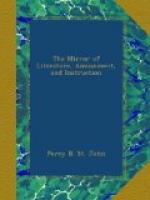Returning to Mr. Pennie’s Tragedies, we must add that a more delightful collection of notes was never appended to any poem. Would that all commentators had so assiduously illustrated their text. Here is none of the literary indolence by which nine out of ten works are disfigured, nor the fiddle-faddle notes which some folks must have written in their dreams.
* * * * *
SNATCHES FROM EUGENE ARAM.
A Landlord’s Benevolence.—No sooner did he behold the money, than a sudden placidity stole over his ruffled spirit:—nay, a certain benevolent commiseration for the fatigue and wants of the traveller replaced at once, and as by a spell, the angry feelings that had previously roused him.
A “Rich” Man.—One who “does not live so as not to have money to lay by.”
An old Soldier.—Set me a talking, and let out nothing himself;—old soldier every inch of him.
A Scholar.—A man not much inclined to reproduce the learning he had acquired:—what he wrote was in very small proportion to what he read.
Study of Mankind.—There seems something intuitive in the science which teaches us the knowledge of our race. Some men emerge from their seclusion, and find, all at once, a power to dart into the minds and drag forth the motives of those they see; it is a sort of second sight, born with them, not acquired.
Happiness.—No man can judge of the happiness of another. As the moon plays upon the waves, and seems to our eyes to favour with a peculiar beam one long track amidst the waters, leaving the rest in comparative obscurity; yet all the while she is no niggard in her lustre—for the rays that meet not our eyes seem to us as though they were not, yet she, with an equal and unfavouring loveliness, mirrors herself on every wave: even so, perhaps, Happiness falls with the same brightness and power over the whole expanse of life, though to our limited eyes she seems only to rest on those billows from which the ray is reflected back upon our sight.
Influence of Cities.—When men have once plunged into the great sea of human toil and passion, they soon wash away all love and zest for innocent enjoyments. What was once a soft retirement, will become the most intolerable monotony; the gaming of social existence—the feverish and desperate chances of honour and wealth, upon which the men of cities set their hearts, render all pursuits less exciting, utterly dull and insipid.




